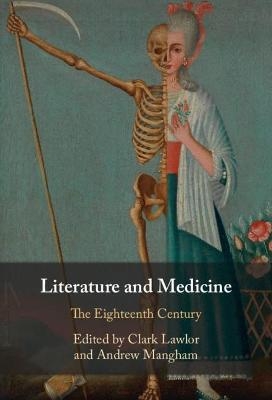
Literature and Medicine: Volume 1
Cambridge University Press (Verlag)
978-1-108-42086-0 (ISBN)
Offering an authoritative and timely account of the relationship between literature and medicine in the eighteenth century and Romantic period, a time when most diseases had no cure, this collection provides a valuable overview of how two dynamic fields influenced and shaped one another. Covering a period in which both medicine and literature underwent frequent and sometimes radical change, the volume examines the complex mutual construction of these two fields via various perspectives: disability, gender, race, rank, sexuality, the global and colonial, politics, ethics, and the visual. Diseases, fashionable and otherwise, such as Defoe's representation of the plague, feature strongly, as authors argue for the role literary genres play in affecting people's experience of physical and mental illness (and health) across the volume. Along with its sister publication, Literature and Medicine in the Nineteenth Century, this volume offers a major critical overview of the study of literature and medicine.
Clark Lawlor is Professor of Eighteenth-Century and Romantic Literature at Northumbria University. He is Principle Investigator for the Leverhulme Trust Major Projects Fashionable Diseases: Medicine, Literature and Culture, ca. 1660-1832, and Writing Doctors: Representation and Medical Personality ca. 1660-1832. His monographs include Consumption and Literature: The Making of the Romantic Disease (2006) and From Melancholia to Prozac: a History of Depression (2012). Andrew Mangham is Professor of Victorian Literature and Medical Humanities at the University of Reading. He is the author of Violent Women and Sensation Fiction (2007), Dickens's Forensic Realism (2016) and The Science of Starving (2020). He has edited the Cambridge Companion to Sensation Fiction (2013), The Female Body in Medicine and Literature (2011) and The Male Body in Medicine and Literature (2018).
Introduction: Literature and medicine in the long eighteenth century Clark Lawlor; Part I. Literary Modes: 1. 'Mere Flesh and Blood': Poetry, Genre and Disease Clark Lawlor; 2. Jane Barker, medical discourse, and the origins of the novel Heather Meek; 3. Imaginary invalids: The symptom and the stage from the restoration to the romantics Roberta Barker; Part II. Psyche and Soma: 4. Mental illness: Locking and unlocking the stereotypes Allan Ingram; 5. From Hypo to Bile: The rise and progress of biliousness in the long eighteenth century Hisao Ishizuka; 6. Metaphors of infectious disease in eighteenth-century literature: Complex comparatives in Daniel Defoe's 'A Journal of the Plague Year' (1722) Noelle Dückmann-Gallagher; 7. Only connect: Romantic nerves, pleasure, aesthetics and sexuality Richard C. Sha; Part III. Professional Identity and Culture: 8. Physician-authors, predisciplinarity and predatory writing: John Polidori Michelle Faubert; 9. 'The Compleat, Common Form': Disability and the literature of the British enlightenment Chris Gabbard; 10. Anatomy and interiority: Medicine, politics and identity in the long eighteenth century Corinna Wagner.
| Erscheinungsdatum | 18.06.2021 |
|---|---|
| Zusatzinfo | Worked examples or Exercises |
| Verlagsort | Cambridge |
| Sprache | englisch |
| Maße | 156 x 235 mm |
| Gewicht | 560 g |
| Themenwelt | Schulbuch / Wörterbuch |
| Geisteswissenschaften ► Sprach- / Literaturwissenschaft ► Anglistik / Amerikanistik | |
| Geisteswissenschaften ► Sprach- / Literaturwissenschaft ► Literaturwissenschaft | |
| Medizin / Pharmazie ► Allgemeines / Lexika | |
| Studium ► Querschnittsbereiche ► Geschichte / Ethik der Medizin | |
| Sozialwissenschaften | |
| ISBN-10 | 1-108-42086-9 / 1108420869 |
| ISBN-13 | 978-1-108-42086-0 / 9781108420860 |
| Zustand | Neuware |
| Informationen gemäß Produktsicherheitsverordnung (GPSR) | |
| Haben Sie eine Frage zum Produkt? |
aus dem Bereich


